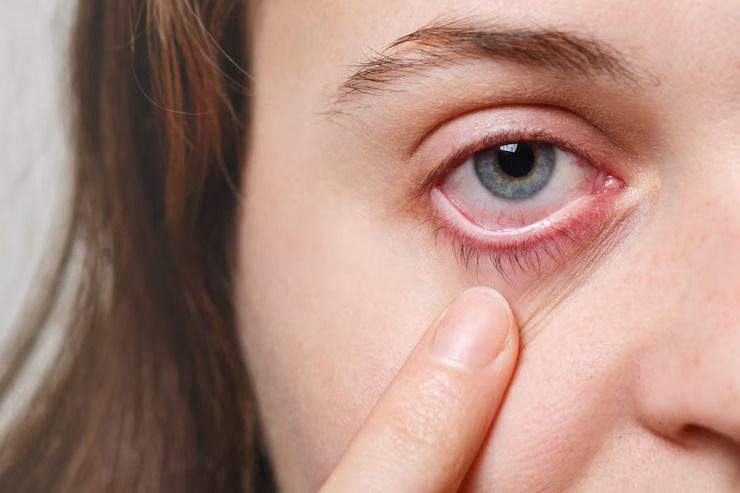Last updated on June 27th, 2025 at 06:14 pm

Understanding Conjunctivitis Types
Regularly referred to as “pink eye” or “eye flu,” conjunctivitis is a common eye illness that medical professionals deal with on a regular basis. Based on its basic reason, it can be divided into three main types:
1. Sinusitis caused by a virus
Serious respiratory infections like the common cold frequently include viral conjunctivitis, which is extremely contagious. Most frequently, an adenovirus is to blame. When in close proximity to contaminated surfaces or secretions, it spreads quickly.
2. Bacterial Conjunctivitis
Usually caused by bacteria like Staphylococcus aureus, Streptococcus pneumoniae, and Haemophilus influenzae, bacterial infections can cause bacterial conjunctivitis. It can be very painful, and in order to avoid complications, treatment must be given as away.
3. Allergic Conjunctivitis
In contrast to bacterial and viral forms, allergic conjunctivitis is not communicable. Allergens such dust mites, pollen, and pet dander can cause it. Scratching, redness, and watery eyes are some of the symptoms.
Healthcare providers can make better diagnoses and treatment suggestions when they are aware of these kinds. Even though the symptoms could be similar, various management approaches are required for the root causes.
Uncovering the Causes of Eye Flu
Depending on the type of conjunctivitis, many reasons may exist. To effectively treat and prevent, the cause must be found.
- Viruses and Bacteria: Infectious agents that cause conjunctivitis are primarily viruses and bacteria. Virus-induced conjunctivitis is frequently associated with respiratory illnesses, whereas bacteria on the surface or respiratory tract cause bacterial conjunctivitis.
- Triggers and Allergens: Triggers for allergic conjunctivitis include mold, pollen, and pet dander. Inflammation of the conjunctiva can also be brought on by irritants including smoking, chlorine in swimming pools, and chemicals.
- Contact lens contamination: One major risk factor is not maintaining needed hygiene for your contact lenses. Infections can result from germs or viruses entering the eye through contaminated lenses.
In order to improve early detection and prevention, health care providers should inform patients about the different causes of conjunctivitis.
Recognizing Conjunctivitis Symptoms
Early diagnosis can lessen symptoms and stop the infection from spreading when conjunctivitis symptoms are present. Common signs consist of:
- Redness and Irritation : The conjunctiva, the thin membrane that covers the white portion of the eye and the inner eyelids, is frequently red and irritated when conjunctivitis is present. In case of redness, Andre I Kul eye drops can be effective.
- Discharge and Crusting : Humans may have clear, watery discharge from their eyes (viral), thick, yellow or green (bacterial), or stringy, white (allergic). Scratching may result from this discharge, especially in the morning.
- Swelling and Tearing : Conjunctival swelling and severe tearing are frequent side effects. Itching is a common symptom of allergic conjunctivitis.
When medical professionals recognize these symptoms, they can offer prompt treatment and avoid effects.
Eye Flu Medicine – What Works Best?
Medication is frequently required for successful conjunctivitis treatment. The root of the problem determines whether medication is best:
1. Antiviral Medications : Although viral conjunctivitis usually goes away on its own, extreme situations might need to take antiviral medicines like acyclovir. When certain viruses, such viral simplex, are the source of the infection, these are given.
2. Antibiotic Ointments and Eye Drops : Ciprofloxacin, tobramycin, and erythromycin are among the antibiotic ointments and eye drops that are frequently used to treat bacterial conjunctivitis. These medication assist in getting care of bacterial infections and minimize problems.
3. Antihistamines and Mast Cell Stabilizers : Mast cell stabilizers and antihistamine eye drops, including olopatadine and ketotifen, help reduce irritation and redness in cases of allergic conjunctivitis. Inflammation can be decreased and histamine release can be stopped by mast cell stabilizers like cromolyn sodium.
For patients to receive the best possible care, medical practitioners must customize their conjunctivitis treatment.

Exploring Potential Side Effects of Conjunctivitis Medications
Drugs for the eye flu can have negative effects even though they are usually safe. Adverse responses must be quickly addressed and patients must be closely monitored for them :
- Local irritation : After applying ocular drops or ointments, some patients may suffer burning, stinging, or irritation in the affected area. This pain is usually only momentary.
- Reactions : Although they are uncommon, allergic responses to eye drugs might happen. The area surrounding the eyes may become more red, swollen, itchy, or rashy.
- Systemic Side Effects : Eye drops seldom result in systemic adverse effects, but when they do, they can sometimes induce unpleasant symptoms like headaches or vertigo, particularly if they get absorbed into the circulation.
In addition to informing patients about possible side effects, medical practitioners should advise patients to seek treatment if their symptoms worsen or continue.
Eye Flu Home Care Remedies
In addition to medications, home treatments may improve the symptoms of conjunctivitis and facilitate recovery:
1. Warm Compresses: Putting warm compresses on the affected eye helps ease pain while helping any discharge to drain. Apply it carefully for a few minutes, many times a day, using a clean, warm towel.
2. Cold compresses: These can help with pain and swelling related to allergic conjunctivitis. For calming comfort, apply a cold, moist cloth around the eyes.
3. Artificial Tears: Lubricating eye drops or over-the-counter artificial tears may recover moisture and ease irritation and dryness in the eyes. They are particularly helpful for allergy and viral conjunctivitis.
Support to use these at-home care solutions can help patients feel more comfortable and heal more quickly.

Steps to Cure Eye Flu
Balancing medical care with preventative actions is recommended for the effective management of conjunctivitis:
1. Medication Adherence: Patients should take their prescriptions as directed, even if it means taking antibiotics for the entire course when treating bacterial conjunctivitis. A partial elimination of the condition may result from missing doses.
2. Personal Hygiene: In order to stop conjunctivitis from growing, it is essential to promote excellent hygiene. Patients should be advised to use separate towels and pillowcases, wash their hands frequently, and refrain from touching their eyes.
3. Avoiding Contact Lenses: Individuals who wear contact lenses ought to stop using them till the infection goes away. Regular lens change and good hygiene are essential to preventing relapse.
These actions will help healthcare providers help patients recover quickly and fully.
Conclusion
Even though conjunctivitis is widespread, it needs to be carefully managed to reduce symptoms and avoid consequences. Healthcare practitioners can give their patients appropriate care and assistance if they have a thorough awareness of the many types, causes, and available treatments.
An all-encompassing approach to managing conjunctivitis must include home care remedies, encouraging good hygiene habits, and managing any possible adverse effects. Patients can minimize suffering and stop the spread of infection by following the correct protocol, which will enable them to recover quickly and completely.
Consider becoming a member of our Medkart community if you are a healthcare professional looking for further information and specialized training in managing conjunctivitis and other eye problems. Gain access to webinars, expert insights, and exclusive information to improve your professional skills and remain current with the most recent developments in eye care. Together, let’s give our patients the finest care possible and encourage better, more lucid eyesight for everybody.
FAQs on Eye Flu Medicine
1. When taking eye flu medicine, what should patients do if they have side effects?
Patients should instantly notify their healthcare professional if they notice any side effects. Serious reactions can necessitate a different course of treatment, although most side effects are minor and transient.
2. Do medicines work for viral conjunctivitis?
Viral infections cannot be treated with antibiotics. In severe cases, antiviral drugs may be administered, but viral conjunctivitis usually goes away on its own.
3. Are there any ways to avoid allergic conjunctivitis?
Avoiding recognized allergens, applying air purifiers, and keeping windows closed during peak pollen seasons are some remedies for allergic conjunctivitis. As an additional precaution, antihistamine eye drops are also an option.
4. How long does it take to get better from conjunctivitis after treatment?
Depending on the type and difficulty, conjunctivitis has varying durations. While viral conjunctivitis might take up to two weeks to clear up, bacterial conjunctivitis usually gets better within a few days of taking antibiotics.
Related links :